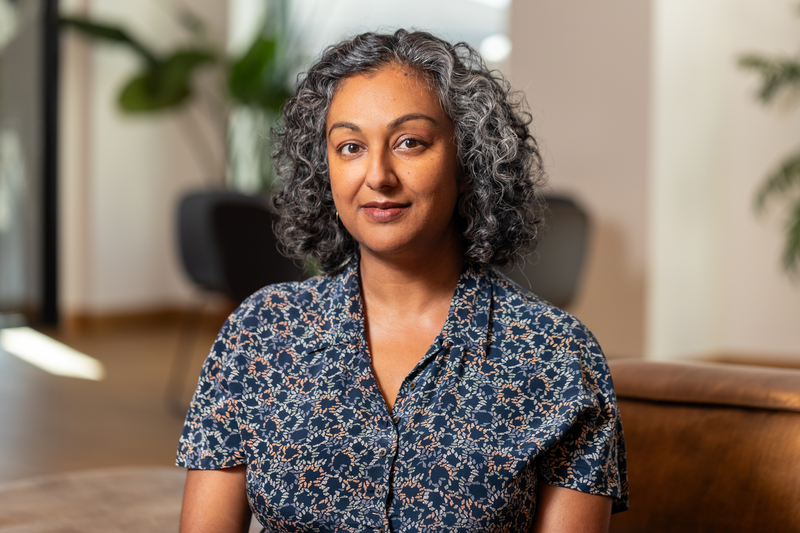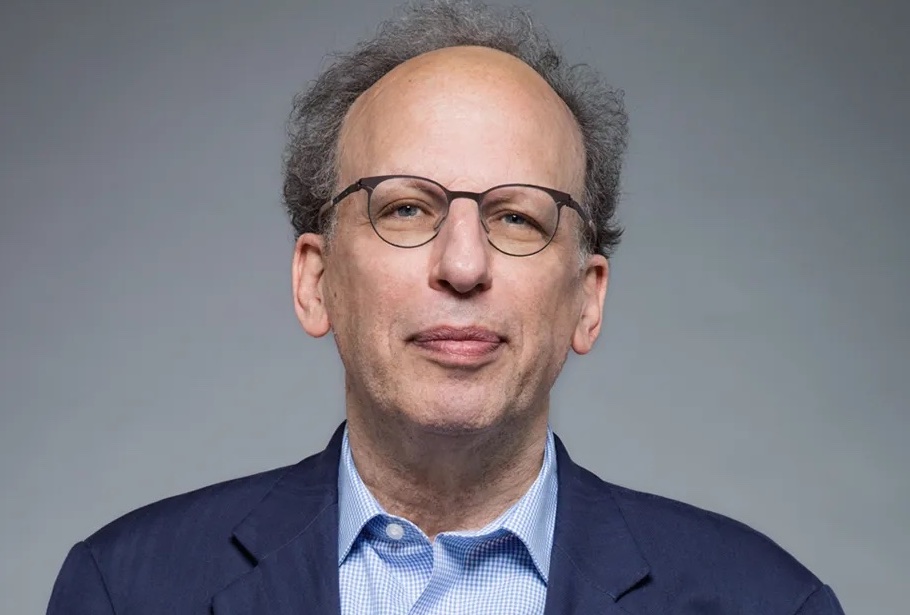
Tasneem Raja. Photo: Kelly Sullivan
Tasneem Raja (‘10) is the Editor-in-Chief of The Oaklandside, a nonprofit, digital newsroom covering Oakland, Calif., where she lives with her family. Founded in March 2020, the newsroom’s mission is to “amplify community voices, share the power of real information, and investigate systems, not just symptoms.” Over her career, Raja co-founded the nonprofit local news startup The Tyler Loop in Texas; was a senior editor of NPR’s Code Switch and launched the Code Switch podcast; and led a team of data reporters at Mother Jones. Read more about Raja’s career here. She’ll be at the J-School on March 15 for the Narrative Journalism reunion where she’ll be interviewed by Constance Hale (’90) during the evening reception.
What got you into journalism?
I am from the Philadelphia area and became a journalist because my parents were big subscribers to the Philadelphia Inquirer. Every Sunday we would get this big, thick Philadelphia Inquirer Sunday Magazine, which was this beautiful glossy publication, and I just thought this was the coolest thing ever. I grew up in the burbs and Philly was the most glamorous, the most interesting city in the world, and here were all these cool, weird stories about all this stuff going on there, and that’s where it started for me. In the second grade or something, I started a little newspaper for the block we grew up on and I did it on my mom’s dot matrix printer … what’s going on in the neighborhood, who’s going on vacation, who’s getting a pet. And everybody loved it. The kids thought it was fine, whatever, but actually the parents really loved it and would always ask me, “When’s the next issue going to come out?” After undergrad, I moved into the city, and my first ever [freelance] piece was a cover story for the Philadelphia Weekly, about a one-hit wonder hip-hop star who got caught up in this embezzlement scheme that was being run out of his record label. Then I went out to Chicago because at the time, [Northwestern University’s journalism school] Medill ran this really cool program called the Academy for Alternative Journalism. They would take young aspiring alt-weekly writers and bring them to Chicago for a summer to study longform narrative journalism.
What brought you to UC Berkeley’s J-School?
The story I worked on for the summer at Medill was bought by the Chicago Reader, and then I went and worked at the Reader for three years; that was still to this day the best job I’ve ever had. The Reader was like The New Yorker of all the weeklies -– the editing, the reporting, the fact checking that I experienced there remains unparalleled in my career. I got in there right at the tail end of the good days, started in 2005. In 2007 they got bought and I saw the investigative reporters and feature writers and arts critics, all much older than me, get picked off, laid off or deciding to leave because they just kind of couldn’t work in the new regime. I was a really good reporter but I loved the newsroom more than anything and I just realized there’s always going to be people who want to be reporters, but there’s just not going to be a lot of people who want to protect newsrooms like this one, who want to build them up and secure their future and make sure that we can keep doing this work. And so I decided to become an editor, and I had no idea how to do that. Sadly, there’s not an editing track at the J-School — we need people to know how to edit, right? You learn that through reporting but you need to know how to manage. [At the J-School] I ended up doing an independent thesis where I edited Oakland North for a year and a half or something, and it was awesome. I worked with Kara Platoni and Cynthia Gorney and all of the reporters who were in the J200s and I totally loved it. I’ve been an editor ever since.
When you think of your time at the J-School, what comes to mind?
I made such good friends at the J-School. We were a little older, a little more experienced than some of the classes immediately preceding and following us. People who had some years under their belts and who were really clear eyed about what they wanted to do in the industry and what the industry was all about. The J-School had gotten this big pot of money to start these new hyper-local sites (so the message was), “By the way, you incoming class of 2010, you guys are going to be the ones that figure the whole thing out.” There was just this real sense of excitement and enthusiasm and affection, covering the big stories, the little stories, arts, culture, housing, development, business, public safety, all of it. We just took it really, really seriously. Five of us still do an annual trip every year. We call ourselves the ‘Sisterhood of the Traveling Journalist.’
What advice would you give incoming J-School students?
I would say really get to know the local media, there’s a really cool journalism scene here in the Bay Area and I think we could be in a new golden age for local journalism. I just think people always want and need local news, local information, local storytelling, local perspective. One thing I’ve been hearing more and more in my circle (is) people saying, “I’m going to tune out of national news, but I want to get more plugged into local news. I want to get more involved locally.”
And for journalists, if there’s a way that you can get involved with a local news outlet, do it. If you live in a place where there isn’t one and you think there should be one and you have the skills, find some way to contribute to the local news ecosystem. People want to love the place they live, they want to understand the place they live, and they want to make a difference in the place they live. And if you can help them do that through the power of information and storytelling, then they might support you, they might help you keep going. The more flexible and nimble you can be — that’s what you have to be as a journalist, no matter what.
What’s on the horizon for you?
I hope to just be lucky enough to do what we’ve been doing for a long time. That would be amazing. I really believe in our mission at Cityside, I see the way that people are responding to this work. Our CEO Lance Knobel always says, “Look, we’re always going to be cycling uphill. This work is never going to be easy because you’re not just putting out great journalism, you’re sustaining the journalism, out there fundraising, you’re out there telling the story every single day and it’s really hard.” But not long ago, we were in the newsroom late one Friday night, not long after the news of the FBI raids in Oakland broke, and we are a relative newcomer on the scene and we are running down stories and filing public records requests and breaking news left and right. I had this moment looking around the newsroom. I said, “You guys, this is the good stuff.” Everybody’s working so hard and they care so much and they have so much integrity and they sweat the details and they just want people to have the information they should get to have in a democracy from a free press. I have no doubt that we’re all going to fight and work really hard to make sure that people keep having access to the information that they need to stay safe, stay healthy, and help their neighbors.



